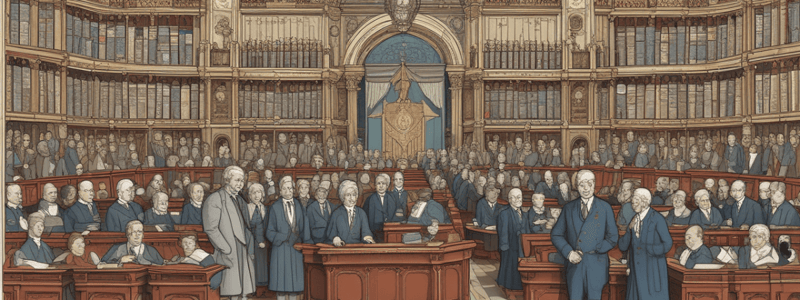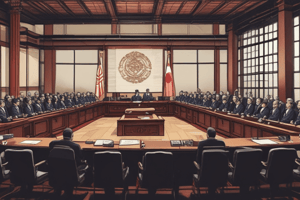Podcast
Questions and Answers
What is the role of the British monarch within the parliamentary system?
What is the role of the British monarch within the parliamentary system?
The British monarch has a purely ceremonial role with very few actual powers.
How does the legislative branch of the British Parliament differ in powers between the House of Commons and the House of Lords?
How does the legislative branch of the British Parliament differ in powers between the House of Commons and the House of Lords?
The House of Commons has significant legislative power, while the House of Lords has very limited powers, able to initiate or delay legislation but not stop it.
What is the primary function of the judicial branch in the parliamentary system?
What is the primary function of the judicial branch in the parliamentary system?
The judicial branch, represented by the Supreme Court, deals with constitutional issues.
In terms of composition, who predominantly makes up the House of Lords?
In terms of composition, who predominantly makes up the House of Lords?
What similarities exist between the British House of Lords and the Canadian Senate regarding legislative powers?
What similarities exist between the British House of Lords and the Canadian Senate regarding legislative powers?
Flashcards are hidden until you start studying
Study Notes
The Parliamentary System
- In Britain, Canada, and other countries, the parliamentary system separates the roles of head of state and head of government.
- Queen Elizabeth II serves as the head of state in multiple countries, including the UK, Australia, New Zealand, Canada, Jamaica, and other Commonwealth realms.
Roles and Powers
- The head of state (British monarch) has a purely ceremonial role with limited powers.
- The head of government (prime minister) holds the real power and forms the executive branch with the cabinet.
Branches of Government
- The judicial branch is the Supreme Court, responsible for dealing with constitutional issues.
- The legislative branch consists of two houses:
- The elected House of Commons
- The hereditary House of Lords (mostly composed of aristocrats and bishops)
House of Lords
- The House of Lords once held significant power, existing to advise the monarch.
- Today, the House of Lords has limited powers, allowing it to:
- Initiate legislation (which must then pass in the Commons)
- Delay (but not stop) legislation approved by the Commons
Canadian Parliamentary System
- The upper chamber in Canada, the Senate, has limited power to:
- Amend legislation
- Delay legislation approved by the Commons
Studying That Suits You
Use AI to generate personalized quizzes and flashcards to suit your learning preferences.




